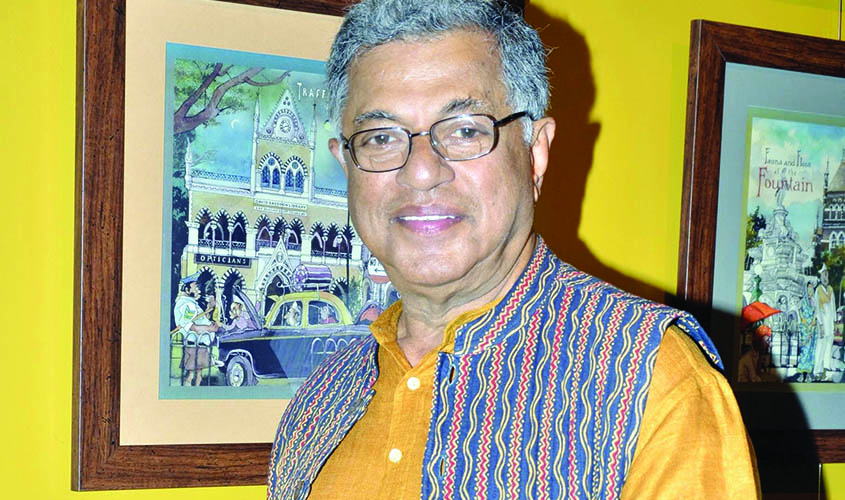Girish Karnad, who passed away earlier this week, will always be remembered for the contributions he made to our age with his work as writer, actor and citizen, writes Anindya Tripathi.
Playwright, actor, director and political activist, Girish Karnad died in Bengaluru on the morning of 10 June. He had been ailing for the last couple of years and used to carry a portable oxygen cylinder as a breathing aid. The cause of death was multiple organ failure. He was 81 years old.
Born on 19 May 1938, Karnad became one of India’s most prominent theatre personalities in the ’60s and ’70s, decades regarded as the renaissance phase of Indian theatre.
He studied mathematics in college, but made a quick transition from the certainties of science to the ambiguities of writing, earning international acclaim for his distinctive style as a playwright whose vision encompassed history, mythology and folklore. Yet at the same time, his was an essentially modern vision.
In his writings, Karnad allowed his characters to ask questions, to struggle with the uncertainties that he had purposely designed for them, and still be raw and relatable. His politics, too, was embedded within his art—in the way it questioned societal norms and traditions.
He wasn’t interested in the grandeur of heroes. Instead, the characters in plays like Yayati, Hayavadana and Nagamandala point towards the heroism inherent in all of us—heroism that surfaces in our day-to-day lives and narratives.
Karnad believed that every playwright has to create a tradition of his own. In keeping with this philosophy, there’s a fertile interplay between mythology, history and legends in Karnad’s art.
Though he wrote only nine Kannada plays, which have been translated into many languages, he is compared to the likes of Vijay Tendulkar, Badal Sircar, Utpal Dutt, Habib Tanvir, Dharamvir Bharti and Mohan Rakesh—the pioneers of modern Indian theatre.
His first play, Yayati (1960), drew upon the resentment and sense of injustice he felt when his parents did not approve of his ambition of settling in England to become a poet. But more significant was the discovery Karnad made when writing this play during his voyage from England to India: that he could write with greater ease in Kannada than in English. It’s also worth noting that Karnad’s native language was Konkani. His love of Kannada can be traced back to his childhood visits to naatak mandlees, where he witnessed Yakshagana, a traditional form of Kannada theatre.
His time at Oxford University imparted him with insights into the English Renaissance theatre, and its influence could be seen in his next play, Tughlaq (1964). This 13-scene play is not only about the fate of the 14th-century Delhi Sultan, Muhammad Bin Tughlaq, but also serves as commentary on how pre-Independence idealism gave way to post-Independence cynicism in the Nehru era. Far from creating history, the play’s protagonist Tughlaq is merely a product of history, and plays into the hands of forces he cannot control (much like Macbeth). Tughlaq won Karnad the Homi Bhabha Fellowship, which enabled him to work on the folk theatre of North Karnataka. He learned how to merge the aesthetics of folk and classical forms, and created his masterpiece, Hayavadana.
Based on Thomas Mann’s 1940 novella The Transported Heads, as well as on the Sanskrit classic the Kathasaritsagara, Karnad’s Hayavadana raises compelling questions on identity and beauty, intellect and physical prowess.
Karnad often drew inspiration from big themes.He wrote about incest in Anju Mallige (1977) and adultery in Hittina Hunja (1980). In Tale-Danda—one of his most poignant works written during his time Chicago. It was written when the Babri Masjid-Ram Mandir issue was at its peak, and discusses caste structures and religion. This play also indicts those intellectuals who remained silent during the Emergency imposed by the Indira Gandhi government in 1975.
It was in the ’70s that Karnad began his cinema career as well. His acting debut happened in 1970, with the Kannada film Samskara, for which he also wrote the script. A year later, he made his directorial debut with Vamsha Vriksha. In his film career, he not only worked with Satyajit Ray, Shyam Benegal and Govind Nihalani, but also made memorable movies like Utsav, Godhuli and Woh Ghar.
When we think of Karnad the actor, we remember him as Swami’s father in Shankar Nag’s television series Malgudi Days. It was perhaps the most relatable role he ever played, of a traditional Indian middle-class man. But he was equally adept at doing mainstream Bollywood films, having featured in recent hits like Ek Tha Tiger, Iqbal and Tiger Zinda Hai.
Political activism was another central part of Karnad’s life. Even with his health failing, he made it a point to speak out against the house arrests of activists across the country and against the culture of intolerance. When the term “Urban Naxal” entered our political lexicon, Karnad said, “If speaking up means being a Naxal then I am an Urban Naxal. I am proud to be a part of the hit list.”
Karnad was someone who never felt the need to parade his patriotism and was always very vocal about his opinions. In the aftermath of the Kalburgi and Gauri Lankesh murders, he was even provided with police security as he had become a target for Hinudtva goons.
He believed in standing up for what he thought was right, and his work will continue to inspire and encourage many more who dream of a better world. As he wrote in Yayati, “You can walk a path without light. How can I walk one without dreams?”

